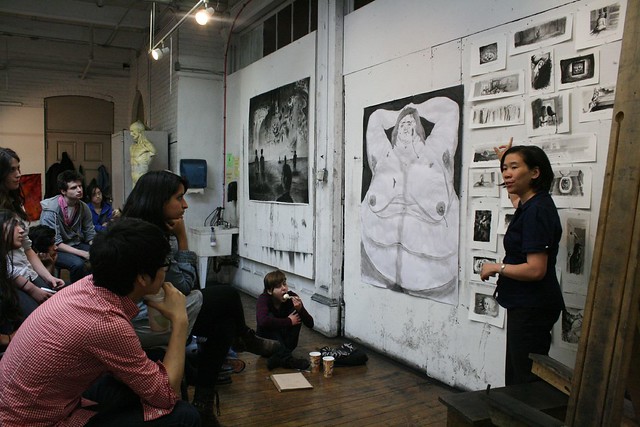“What should I be working on now if in the future I would like to be an Art Professor as well?
Being a professor is a delicate balance of many different kinds of skills. You have to command extensive knowledge of your subject matter, understanding the fundamentals and the details inside out. Communication skills are key to being an effective teacher, and being accessible as a person is vital.
1) Observe your professors.
This is hands down the most informative way to learn about how to be a professor. You’ll learn tremendously from observing a strong teacher in action. Analyze what your professors do during class sessions, what do you notice about their teaching style? What kinds of structures, actions, and strategies do they employ in their classroom that are effective?
I had an illustration teacher who once assigned a 9″ x 12″ drawing. He took one look at one student’s drawing, whipped out a tape measure, announced that the student drawing was 9″ x 11.5″, and then refused to critique the piece. It was an important lesson for the students in terms of fulfilling specific requirements. Another teacher told me that when her class was looking really exhausted and lifeless during a group critique that she used to make them go outside and run laps around the church across the street.
Not only should you take note of what works, but also take note of what doesn’t work. I had a teacher who used to critique student works from best to worst. He would ask the students to pick the “best” work in the class first, and then work down from there. It was a terrible system as the best works always got the longest critique, and the works towards the end of the critique received little attention.
2) Write and collect technical notes.
If you’re taking a technique driven course, take detailed notes on the technical process. I wish I had done this more as a student. Practice writing your own technical handouts, how would you verbally explain this process to another person? I saved all of the technical handouts that I received during my undergraduate years at RISD, and I still reference many of them to this day. In graduate school, every time I learned a new technique, I wrote a technical handout. This was a great exercise as it got me to understand the technique better and also was a good reference that I used in the future.
3) Learn as many techniques and approaches as possible.
Versatility is huge as a teacher. You want to build a varied, well-rounded background for yourself in which you have an understanding of a subject from multiple points of view. If you are only capable of teaching one subject and one way of working, not only does this limit you as an artist, but it also limits the number of teaching jobs that you’re eligible for. I worked in drawing, painting, printmaking, and sculpture as a student, and today I’m capable of teaching courses in any of those areas.
4) Develop your speaking skills.
Before I became a teacher I was a very shy person and didn’t like to speak in front of people. That all changed when I started working as a student teacher at an elementary school my senior year in high school. All of the sudden, I had this defined role in the classroom that provided me the authority to be able to speak my mind.
That structure gave me the confidence to speak up in group situations, and served me well when I made the transition to RISD as a freshman. I enjoyed participating in group critiques, and learned tremendously about how to communicate my thoughts verbally. Use every class discussion as an opportunity to hone your speaking skills, keeping in mind that you are in essence, training for your future as a teacher.
ART PROF is a free, online educational platform for visual arts for people of all ages and means. artprof.org features video courses, art critiques, an encyclopedia of art supplies, and more.
PORTFOLIO VIDEO CRITIQUES
Prof Lieu offers video critiques on portfolios for students applying to art school and working artists. More info.
ART DARES
Every month, we assign a topic for you to respond to with an artwork. We give out prizes in several categories! More info.
ASK THE ART PROF was a written column in the Huffington Post from about art related topics. Visit our Pro Development page.
Related articles
“How do I become an undergraduate art professor?“
“What makes a student artist stand out from their peers?”
“How did you become an art professor?”
“How do I become a teaching assistant?”
“How can I make the transition to teaching art at the college level?”


